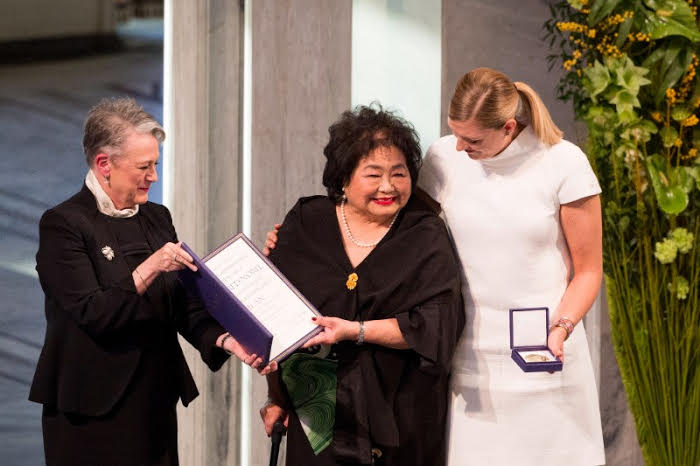 The recent awarding of the 2017 Nobel Peace Prize in Oslo, Norway, made news in many countries, if not our own. It is awarded each year on Dec. 10, the day the Universal Declaration of Human Rights was adopted by the United Nations General Assembly in 1948.
The recent awarding of the 2017 Nobel Peace Prize in Oslo, Norway, made news in many countries, if not our own. It is awarded each year on Dec. 10, the day the Universal Declaration of Human Rights was adopted by the United Nations General Assembly in 1948.
In elegant surroundings, 1,000 invited guests applauded as two dedicated activists received gold medals on behalf of the International Campaign to Abolish Nuclear Weapons’ successful 10-year campaign for a United Nations nuclear weapon ban treaty. ICAN was awarded the prize “for its work to draw attention to the catastrophic humanitarian consequences of any use of nuclear weapons and for its ground-breaking efforts to achieve a treaty-based prohibition of such weapons.”
ICAN is a coalition of 468 non-governmental partners in 101 countries. The landmark global agreement was adopted by 122 countries at the UN General Assembly in July 2017, and will go into effect when ratified by 50 countries.
In the 1980s, hundreds of thousands demonstrated worldwide against nuclear weapons. But these are unfortunately not fears of yesteryear: today nine countries have 15,000 nuclear weapons, and threats of their use endanger us all. Those nine countries, led by the USA and Russia, did not vote for the treaty, and only Israel sent an ambassador to the Peace Prize ceremony. Usually all countries are represented.
The full ceremony is on-line on YouTube and it is worth watching at least some of the 1 hour and 37 minute event, including speeches by ICAN’s executive director, Beatrice Fihn and ICAN activist Setsuko Thurlow, 85-year-old survivor of the 1945 atomic bombing of Hiroshima and tireless advocate for nuclear disarmament.
https://www.youtube.com/watch?v=P1daV8n6fTY
We thank ICAN for its work, which in many ways has just started.
Anna Gyorgy
Wendell
Coordinator of the Women & Life on Earth internet project, part of Traprock Center for Peace & Justice
This article first appeared: Athol Daily News: 12/19/2017 – A Prize That Matters
